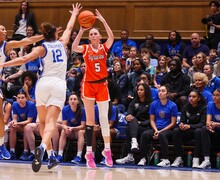Administrators host ‘Speak Out’ to stimulate discourse
Syracuse University Chancellor Nancy Cantor used a ‘Speak Out’ Thursday night in Hendricks Chapel to address the campus community about ending self-segregation.
The meeting and open discussion brought together SU students, faculty and staff, along with members of the Syracuse community, to listen to many people speak about the material aired on HillTV, racial divisions on campus and the actions the university will take to work toward fixing these problems.
Many members of the audience attended Wednesday night’s town hall meeting in the Schine Student Center Underground. Similar to the town hall meeting, the seats in Hendricks Chapel were all filled on the bottom floor and some students sat in the balconies. Many also lined the walls on the sides and back of the room.
General production members of the HillTV staff sat in the first several rows.
The Rev. Thomas Wolfe, dean of Hendricks Chapel, began the meeting by welcoming everyone and saying he was glad to see so many people who wanted to voice their opinion of oppression at SU.
‘This is not the first occasion where people have been brought together to have an honest conversation like this,’ Wolfe said. ‘So, I am glad that you are here.’
Cantor took a few minutes to speak to the audience about the future of HillTV. She said the administration has decided to disassemble HillTV as a recognized student organization. She said ‘Over the Hill’s’ actions left the university no other choice but to disband the entire station.
However, the university is putting together a committee to start a new student-run television station on campus, she said. She encouraged the entire university to take part in the new station. Until this new station is up and running, students will have the opportunity to work with the S.I. Newhouse School of Public Communications’ Orange Television Network.
Before the meeting, concerned campus citizens had the opportunity to sign up for a time slot to address their concerns.
Many of the speakers were representatives of student groups on campus such as the NAACP, Inter-Fraternity Council, presidents of the Pi Beta Alpha fraternity and Delta Delta Delta sorority, La LUCHA, Student African-American Society, A Men’s Issue, the SU Step Team, Outrage and HillTV.
Others were students, professors and members of the Syracuse community.
Wolfe called the speakers up in groups of five. Each person was allotted a few minutes to speak to the attendees.
Many students took the time to voice the disgust they felt for the ‘Over the Hill’ clips, and how the clips affected them physically and emotionally.
‘This is a very, very painful moment,’ said Micere Githae Mugo, chair of the department of African-American studies. ‘It is a shame to see that the advancement in technology can be used for destruction – used to destroy.’
Mugo said she considers herself a global citizen and, as one, she thinks others need to educate themselves about the differences among people. It was appalling to think anyone could possibly find issues such as rape and hate crimes funny, she said.
‘I am sickened by the thought that lynching can be a funny thing,’ Mugo said.
Jackie Cho, a sophomore in Newhouse, read the Daily Orange letter from Thursday’s paper in which the writer stated minorities are just as racist against white people as whites are to minorities.
The writer also stated minorities overreact to racially charged situations. The writer said everyone should simply be seen as ‘human being’ and not ‘black and white.’
‘Are we oversensitive?’ Cho asked. Members of the audience gave a unified ‘no,’ and she left the lectern.
Other students chose to focus their emotions on the members of HillTV, especially those of ‘Over the Hill.’
‘Genocide comes from this kind of seed that has been planted by HillTV,’ Mugo said.
She compared the genocide that occurred in Rwanda to what is currently taking place on campus. Mugo said the Rwanda genocide began when offensive jokes were being broadcast over the radio.
‘These students were not sorry for their actions,’ said Tamekia Hosang, Student African-American Society president. ‘They were sorry that we as a community would no longer allow this to happen.’
Hosang said she feels she will not be safe as long as the students from ‘Over the Hill’ are still attending SU. She wants to see the students expelled from the university and wants an example made of them.
The university’s slogan ‘No Place for Hate’ is plastered all over campus, but it means nothing to her, she said.
Collin Capano, representing A Men’s Issue, was shocked at the clips shown at the town meeting Wednesday night. However, he was more appalled with the behavior of the audience than the ‘Over the Hill’ members.
When the lynching clip was played, many students anticipated it and reacted to the image.
He couldn’t believe that anyone could laugh at the picture of the two men hanging, Capano said through tears.
The worst part, he said, was that the members of the audience wanted to physically beat up the ‘Over the Hill’ members.
‘We’re looking right into their faces and didn’t recognize them as people,’ Capano said. ‘We did the same thing last night.’
Other speakers expressed their anger for Newhouse and The D.O. as well.
Newhouse was blamed for breeding hate among its professors and students, many members of the audience agreed.
However, professor and Department Chair Hubert W. Brown of Newhouse said the college’s goal is to educate its students about the media. Offensive humor is not something that is promoted.
Jamar Hooks, vice president of the Student African-American Society said, however, The D.O. has been producing racist material for years.
Many audience members agreed The D.O. does not accurately represent their people in its stories.
Jared Novack, editor in chief of The D.O. spoke to the assembly about how he wants people to e-mail him suggestions of how to make the paper better.
Some speakers chose to focus their time at the lectern on working toward possible solutions to the self-segregation at SU.
Many audience members agreed ‘Over the Hill’ would not have been allowed to hurt so many people if a system was set up to check the content before it aired.
Several times speakers mentioned that people who are not aware of the many differences among the campus community should educate themselves.
Joan Gabel, a representative with Students Advancing Sexual Safety and Empowerment said both women’s and African-American studies classes should be part of the core requirements of the university.
Brown used the example, ‘A doctor can bury his mistakes, but an architect can only advise his clients to plant mines,’ to show how the SU community must work together to make change happen.
‘It’s time to participate,’ Brown said. ‘More dialogue and more speech is what’s going to move this along.’
Published on October 20, 2005 at 12:00 pm





